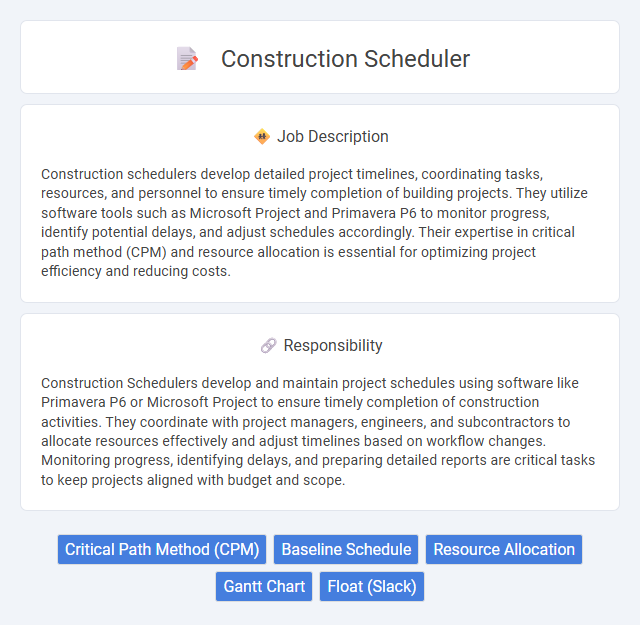
Construction schedulers develop detailed project timelines, coordinating tasks, resources, and personnel to ensure timely completion of building projects. They utilize software tools such as Microsoft Project and Primavera P6 to monitor progress, identify potential delays, and adjust schedules accordingly. Their expertise in critical path method (CPM) and resource allocation is essential for optimizing project efficiency and reducing costs.
Individuals with strong organizational skills and an aptitude for detail are likely suitable for a Construction Scheduler role, as the job demands precise planning and timeline management. Those who may struggle with high-pressure environments or multitasking could find the position challenging. Success in this role probably depends on an ability to coordinate diverse teams and adapt to changing project conditions efficiently.
Qualification
Construction Scheduler positions demand proficiency in project management software such as Primavera P6 and Microsoft Project, alongside a solid understanding of construction processes and scheduling methodologies. Candidates typically require a bachelor's degree in construction management, engineering, or a related field, coupled with strong analytical and organizational skills to develop and maintain detailed project timelines. Certification like the PMI Scheduling Professional (PMI-SP) or AACE International's Planning & Scheduling Professional (PSP) enhances qualifications, ensuring expertise in resource allocation and risk management within complex construction projects.
Responsibility
Construction Schedulers develop and maintain project schedules using software like Primavera P6 or Microsoft Project to ensure timely completion of construction activities. They coordinate with project managers, engineers, and subcontractors to allocate resources effectively and adjust timelines based on workflow changes. Monitoring progress, identifying delays, and preparing detailed reports are critical tasks to keep projects aligned with budget and scope.
Benefit
A Construction Scheduler role likely offers significant benefits such as improved project efficiency and resource allocation, reducing delays and cost overruns. Professionals in this position may experience enhanced career growth opportunities due to their critical role in project management. Companies could benefit from better risk management and streamlined communication among stakeholders.
Challenge
Construction scheduler roles likely involve navigating complex project timelines under evolving circumstances, where anticipating delays and resource constraints is crucial. Effective scheduling probably requires continuous analysis and adjustment to maintain workflow efficiency and meet deadlines. The challenge may lie in balancing competing priorities while ensuring clear communication among diverse teams.
Career Advancement
Construction schedulers play a critical role in project management by developing detailed timelines that optimize resource allocation and ensure timely completion of construction projects. Mastery of advanced scheduling software such as Primavera P6 and Microsoft Project enhances job performance and opens pathways to senior project management or construction management roles. Gaining certifications like the PMI Scheduling Professional (PMI-SP) significantly boosts career advancement opportunities within the construction industry.
Key Terms
Critical Path Method (CPM)
Construction Schedulers utilize the Critical Path Method (CPM) to develop detailed project timelines that identify essential tasks and determine the minimum project duration. By analyzing task dependencies and durations, CPM enables schedulers to pinpoint the critical path, ensuring effective allocation of resources and timely project completion. Mastery of CPM software tools such as Primavera P6 or Microsoft Project is vital for precise schedule optimization and risk management in complex construction projects.
Baseline Schedule
A Construction Scheduler develops and maintains the baseline schedule to ensure project timelines align with contractual requirements and resource availability. They integrate detailed task sequences, milestones, and critical path analysis into the baseline schedule to monitor progress and identify potential delays. Expertise in software like Primavera P6 or Microsoft Project is essential for creating accurate, updatable baseline schedules that guide project execution and stakeholder communication.
Resource Allocation
Construction schedulers optimize resource allocation by coordinating labor, equipment, and materials to ensure project timelines are met efficiently. They analyze project workflows to balance workloads, prevent bottlenecks, and minimize downtime. Effective resource management in construction scheduling reduces costs and enhances overall productivity on site.
Gantt Chart
Construction Schedulers develop and maintain detailed Gantt charts to visualize project timelines, track progress, and manage resource allocation efficiently. These charts enable clear identification of task dependencies, critical paths, and potential bottlenecks, ensuring timely project completion. Expertise in software like Microsoft Project or Primavera P6 is essential for creating dynamic, updateable Gantt charts that support effective project monitoring and control.
Float (Slack)
Construction schedulers meticulously analyze project timelines to identify and manage float, also known as slack, which represents the amount of time a task can be delayed without impacting the overall project completion date. Effective float management enables schedulers to optimize resource allocation, mitigate risks, and accommodate unforeseen delays while maintaining critical path integrity. Precise monitoring of total float and free float ensures construction projects stay on schedule and within budget.
 kuljobs.com
kuljobs.com